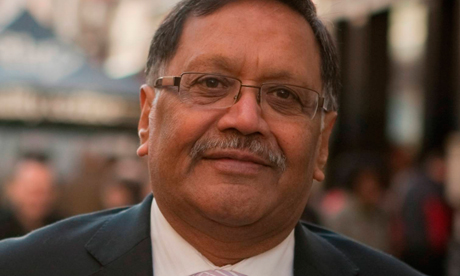London Assembly says Dow sponsorship damages Olympic Games

Drop Dow Now: London Assembly Member Navin Shah, proposer of the motion condemning the Dow Olympic partnership
The London Assembly has condemned the decision of the International Olympic Committee (IOC) to select Dow Chemical Company as a Worldwide Partner.
The motion, passed on Wednesday 11 July, states that the partnership between the Olympics and Dow has “caused damage to the reputation of the London 2012 Olympic and Paralympic Games” and called upon the London Organising Committee of the Olympic and Paralympic Games (LOCOG) to recommend that the IOC become more stringent in its selection of Worldwide partners and high profile sponsors.
The US-based Dow has been engulfed in controversy ever since its 2001 acquisition of Union Carbide Corporation (UCC), owners of the ill-fated Bhopal pesticide plant in India at the time of the Bhopal gas tragedy (December, 1984), one of the worst industrial incidents in history and one that claimed thousands of lives, injured countless more, and ultimately, shattered a community.
Although in 1989 UCC and the Indian government did agree a compensation package of $470m the settlement has proved insufficient as contamination is still a serious issue in Bhopal and its residents are struggling to deal with the personal, social and political fallout of the disaster, as well as numerous related health problems that still persist nearly thirty years after the incident.
In the eyes of those who still campaign and their many supporters the responsibility for these problems now lies with Dow: Dow does not agree.
Dow’s association with the Olympics began in 2010 when, in a move designed to improve its corporate image, it signed a £63m 10-year partnership deal with the IOC and the following year agreed a £7m deal to sponsor the wrap that now surrounds the London Olympic Stadium.
However, the increased media attention brought about by Dow’s association with the world’s largest sporting event has only served to increase the scrutiny over a past that it had hoped would remain buried, or at least obscured, by the deepening sands of time and an expensive public relations makeover.
Yet even so, despite the obvious ethical complexities surrounding the partnership, LOCOG, in particular Sebastian Coe, have repeatedly defended the Olympic-Dow partnership from criticism and refused under any circumstances to reconsider the deal.
In contrast, many of the capital’s politicians, chief among them Labour London Assembly Member Navin Shah, the proposer of the motion, have been extremely vocal in their protestations against Dow’s association with the London Games and will undoubtedly welcome this latest development, especially considering the failure in March 2012 of a more ambitious motion aimed at cancelling the controversial partnership.
The successful vote was also welcomed by the long-time critic of Dow, Amnesty International, who almost immediately after the motion was passed issued a press release in which they described the London Assembly decision as a “further testament to the sense of betrayal that people feel about the decision to associate with Dow” and called on Sebastian Coe to apologise to the victims of the Bhopal disaster.
Peter Frankental, Economic Relations Programme Director at Amnesty International UK also added: “I hope that Seb Coe and LOCOG are starting to get the message loud and clear; people do not want Dow’s toxic legacy tainting the Olympics for them.”
However, despite the mounting pressure it is highly unlikely that either of Dow’s agreements with the IOC and the LOCOG will be cancelled. Nevertheless the London Assembly decision weighs in on both the Bhopal-Dow saga and the wider issue of ethical standards in the sponsorship of the Olympic Games.
